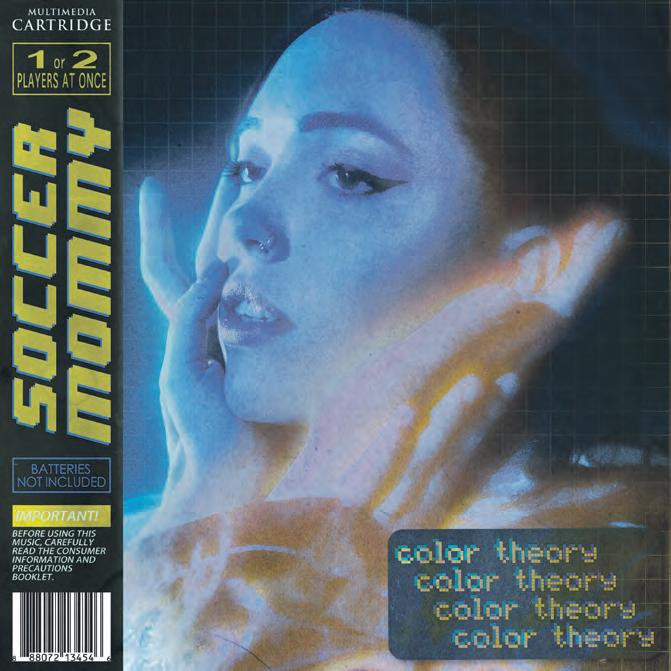
41 minute read
Albums
Album of the month SOCCER MOMMY — color theory
Released 28 Feb byLoma Vista rrrrr
Advertisement
Listen to: bloodstream, circle the drain, royal screw up
soccermommyband.com
Sophie Allison, aka Soccer Mommy, just keeps getting better. Her latest record surpasses any expectations set by 2018’s Clean, which set her apart from the crowd with its effortlessly cool pop energy, razor-sharp riffs and wise takes on adolescent turmoil. With color theory, Allison revives a fiery and rebellious noughties aesthetic, upgraded with enchanting sonic clarity. ‘I’m the princess of screwing up!’ she declares on royal screw up, surely with pop-punk heroine Avril Lavigne in mind. “I feel like it really bangs,” admits Allison in an interview with The New York Times, and she’s not wrong. color theory is brimful of delicious melodies, finding a place for both her signature brash earworms like Your Dog and the innocent prettiness of Blossom and Switzerland. color theory finds Allison digging a little deeper, addressing topics that she may have previously been avoiding. The record consists of three distinct parts – a spectrum of emotions – each embodying a corresponding colour: blue for depression; yellow for paranoia, mental and physical illness; grey for death. Although the majority of the record is upbeat, a closer look shows Allison staring misery in the face, tackling,
Read more online: theskinny.co.uk/music/reviews/albums in particular, emotions surrounding her mother’s terminal diagnosis when she was a pre-teen. But far from providing resolution, the record is a candid portrait of a woman still very much in turmoil; untangling the knots of trauma, of depressive numbness, of the realisation of her own mortality. ‘I’ve barely left my room in the past week’, she sings serenely on bloodstream, cheerfully chugging guitars carrying her along while her world falls apart. With circle the drain, Allison longs to feel ‘calm’, ‘strong’ for her loved ones, but is unable to escape her turmoil. The song’s power lies in the mismatch of the music and the lyrics, in the relief that never comes. As the chorus reaches a kind of sonic resolution, you wait for the resolving line but are left only with the strange conclusion: ‘I’m going down’. On one hand, color theory could easily be enjoyed as intelligent and catchy indie-rock; on the other, it could be heard as something much more disquieting. By juxtaposing shatteringly sad lyrics with the cheeriness of the music, Allison presents her pain as unconquerable; too big to look at directly. When there can be no possible relief, she has to find a way to live on anyway. Maybe this is it: ‘Can’t erase the hue / It’s just coloured over’. [Katie Cutforth]

La Roux Supervision RRRRR “a let down”

Tame Impala The Slow Rush RRRRR “a partial reinvention”

Peggy Sue Vices RRrRR “more than double-tap worthy”

Nada Surf Never Not Together RRRRR “business as usual”

Beach Bunny Honeymoon RRRRR “a solid effort”
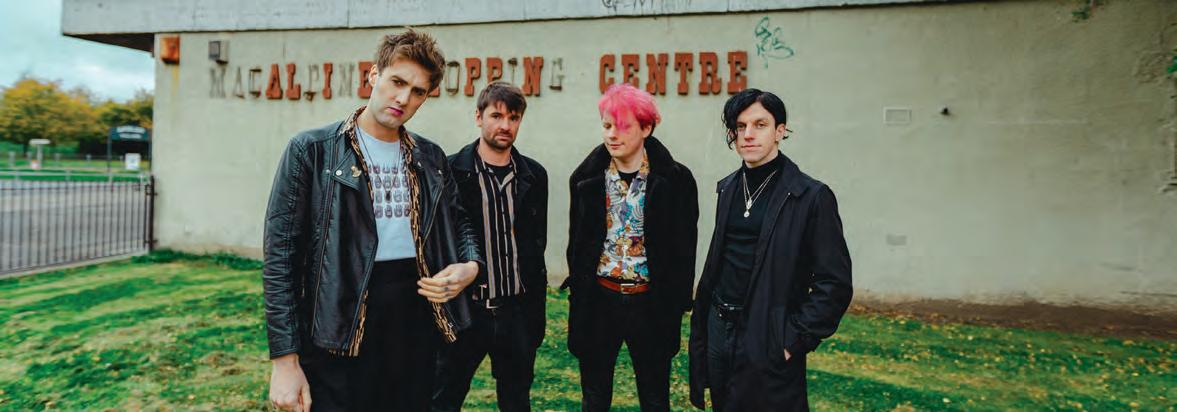
Fresh Break
Leaving The Mirror Trap firmly in the past and looking forward with a pensive eye on humanity’s growing lack of human connection, Echo Machine frontman Gary Moore talks creating the chaotic synth-pop soundtrack for a detached generation
Interview: Dylan Tuck
Echo Machine Instant Transmissions [28 Feb, Riverman Records and Assai Records]
Echo Machine play in-stores at Assai Records, Dundee, 28 Feb; Assai Records, Edinburgh, 29 Feb
facebook.com/echomachinez
Having past experience always offers a useful tool to aid in carving a fresh path. ‘You live you learn’, as Alanis Morrisette once sang. Gary Moore – once frontman of The Mirror Trap and now leader of that band’s quasi-reincarnation, Echo Machine – wanted to do something, as he puts it, “fun” in their new venture, and so started demoing ideas in his bandmate’s bedroom back in 2018. “[Echo Machine] kind of happened by accident, really. It almost felt [in previous bands] we were doing something we weren’t really into anymore. As soon as we got that fresh break, we thought it was time to do what excites us more.” Despite The Mirror Trap’s dissolvement, the ex-members’ creativity was not to be bottled up and stored on a shelf of old records and tour memorabilia. Instead, they sought to start anew, beyond the banality of generic rock acts been and gone. That meant dabbling with a shed-load of synths, playing some wild live shows, and leaving band tropes behind. “I think something people do when they start a band is to have a checklist about what bands need to do, like wear a leather jacket and sunglasses, buy a distortion pedal, be very serious and do outrageous things – it’s all a bit clichéd and pointless. When you’ve done it for a few years, you realise you’re a bit silly.”
Shedding their skin, being an authentic human and accepting chaos is part and parcel of what Instant Transmissions – the band’s emphatically electric debut – is all about. “I remember watching a documentary about some guy in a maximum security prison who had a night out all suited and booted, blacked out, and then woke up with dead bodies around him,” Moore recalls. “I think that’s a strange way of understanding what our live shows are like. We have the best intentions to be a slick operation, but then three songs in, everyone’s bleeding, there are things on the floor and everyone is half-naked. I think we just embraced that chaos on the album.” As crazy an analogy as that may seem, it’s actually quite a refined take on what is a flamboyant and daring debut. The record oozes in and out of driving alt-rock and sickly-sweet synth-pop, channeling inspiration from Duran Duran and OMD that’s laced with an after-shot of Queens of the Stone Age and Death from Above; like a multi-flavoured, sweet and savoury smoothie. “I had a fear when I first heard the album back that nobody is going to play this on the radio because it just sounds ridiculous,” says Moore. “But equally, I’m hopeful that’s maybe what cuts through.” Inventive, quirky and sonically chameleonic, it’s certain to turn heads, if not have them bobbing along. Instant Transmissions is a tale of human experience in a world where “everything feels mechanised”, individuality is sold as a commodity, and people adopt a variety of different characters, exploring the repercussions of such an existence. “[The record] was written at a time when I was looking for jobs,” Moore notes. “I was going from one global chain to another and everything felt like there was no human element to it anymore. I think the whole story of the album – if there is one – comes from that feeling, kicking against it, feeling a bit useless and therefore getting a bit self-destructive.”
Recorded at La Chunky in Glasgow under the guidance of producer SAW (who Moore describes as “a complete maniac”), Instant Transmissions was born, but not without a few hiccups – namely, running out of money and having to spend a week sleeping under the mixing desk of said studio. Despite suffering for their art, the pain provided results and pushed them further to be more “extreme” and “play harder and louder”. Moore continues: “I feel a bit underwhelmed by so much music – even the good stuff can feel a bit safe. Our producer had the same ideas as us and we were egging each other on in the studio to be a bit sillier.”
What Moore calls silly, most would call innovative – stitching together a cacophony of noise into bouldering, dance-inducing moments of mayhem. Echo Machine are a far cry from the buzzing rock of The Mirror Trap, but it’s not impossible to find traces of their old band filtering through – from the crashing carnage on Chameleon to the digitized distortion found on The Road. There’s growth on Instant Transmissions, as an experienced team of musicians step forward into the unknown. Gone are the days of tinnies and blaring noise in a studio; now they demo repeatedly like perfectionists of their trade. And the result? A fresh-sounding, cathartic pop record by a band with a new sense of freedom.
Making It Up
New post-punk upstarts Bikini Body chat about their ramshackle process, being inspired by The Daily Mail and the perils of saying sorry via a parrot
Interview: Lewis Wade
Bikini Body Pond Life [5 Feb, self-released]
Bikini Body play Sneaky Pete’s, Edinburgh, 5 Feb
facebook.com/ bikinibodymusic
“I can sing fine, I can carry a tune, but that’s not going to go down in the annals of history – oh fuck, I sound like such a wanker.” So muses vocalist Vicky Kavanagh on the origins of her “shouty” delivery style, more indebted to Mark E. Smith improv than curated affectation; “we embraced the weird from the start.” It’s indicative of the conflicting combination of conviction and self-deprecation that Bikini Body bring to the table with their “family friendly post-gutter-skunk-funk.” Their small collection of songs already boasts acerbic takes on classism, male douchebaggery, existentialism and parrots trained to be vindictive (of which more later), but cut through with a self-awareness that doesn’t so much tie the sentiments and author in a neat bow, but a true-to-life knotty mess.
The Edinburgh-based four-piece came together about six months ago, with Kyle Peterson (bass) and Kavanagh bonding over post-punk, and psy-trance, at work before Kavanagh drunkenly revealed her writing at the pub, prompting a snap decision to form a band. So they did just that, recruiting Josh Booker (guitar) and Dan O’Gorman (drums) and getting together to jam, though without any idea of what they were actually going to create. The group emphasise an organic process to their music without any sense of individual ego – even their conversational dynamic is often charmingly egalitarian, each member working together in what seems like a natural fit.
“Every other band we’ve been in there’s always been one person coming in with the songs, whereas none of us know exactly what we’re doing,” says O’Gorman. Kavanagh adds: “It does sound like we’re making it up as we go along.” Booker agrees: “That is pretty much our approach,” with Peterson concluding: “We’re basically making free jazz.” They first played live under the fabulous makeshift moniker Lady Zinfandel & the Barony Boys before settling on Bikini Body after months of being nameless, in time for a flurry of gigs at the end of the year. “My suggestion was Samwise Gangrene,” remembers Peterson, while Kavanagh’s addition was “Segue Segway... one for the intellectuals, there.” But, ultimately, it was back to the usual fount of inspiration. Kavanagh continues: “We were stuck, so I said let’s look in The Daily Mail because they always put really funny descriptions of women in there, and the first thing was ‘so-and-so shows off her bikini body at the beach’ and I thought ‘great, it’s alliterative’... It was either that or Leggy Display.”
Many of the shows were booked at short notice as support for bands Photo: Cameron Fitzsimmons who’d seen them at Leith Depot or Henry’s Cellar Bar, while an EP launch show is taking place at Sneaky Pete’s on 5 February – booked on the spot after they were spotted at Cabaret Voltaire. The EP has five songs, including the already released So Posh. It’s mostly Kavanagh’s takes on a variety of grievances over rattling post-punk, with the odd hint of jangle-pop (Hands Off), often led by elastic ESG-bass or taut Gang of Four instrumentals. So Posh, for example, “started as a jam on a Viagra Boys song, before [Kavanagh] came in with the vocals.”
One of the most fascinating, hilarious and cryptic songs comes in the form of Georgie Weaver. Kavanagh relates the whole bizarre story, perfectly encapsulating the way a song can be both a hyper-specific moment of random nonsense and also a highly relatable snapshot of male entitlement. “He might be a real person, we’re still not sure,” she says. “We were on a night out, to initiate Dan. He quickly interjects: “I threw up in my sink that night.” He continues: “We were on West Port and this old man, so pissed he’s frothing at the mouth, starts chatting at us, uninvited... telling us how much he knows about East Sussex (Kavanagh’s home county). [He] says he was in love with a girl called Janet Weaver who didn’t like her dad for being some sort of absentee father, so the dad buys her a parrot to say sorry. But she hates her dad, so she taught the parrot to say,” – he quickly adopts a squeaky parrot voice – ‘fuck you, Georgie Weaver!’”
Peterson continues: “Then you made a voicemail to try and remember the story and I actually made a song with cut-up bits from the voicemail over a shitty drum machine.” Kavanagh adds: “I tried to recreate the voicemail for the song in Dry Cleaning style, but it wasn’t really working so I made it into a song about how sometimes men (usually men) think it’s alright to interrupt your night to tell you a shit story – something you don’t care about but are too polite to stop.”
While there isn’t always rhyme or reason to the Bikini Body process, there’s a whole heap of heart and unpretentious good times to be had with this young band.


Pictish Trail Thumb World [Fire Records , 21 Feb] rrrrr
Listen to: Thumb World, Lead Balloon, Repeat Neverending
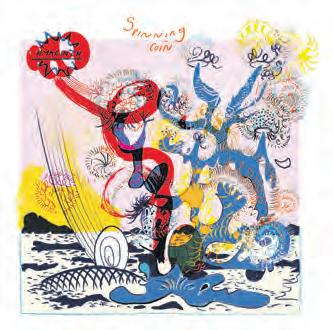
Spinning Coin Hyacinth [Geographic, 21 Feb] rrrrr
Listen to: Black Cat, Ghosting, Never Enough Four years in the making, Thumb World follows Pictish Trail’s SAY Awardshortlisted Future Echoes in style. Johnny Lynch opens the doors to his Isle of Eigg home, and produces an electro-acoustic psych-pop wonder, concerning everything from alien abductions to pigs that look like Donald Trump. If that makes this album sound like a self-indulgent folly made by some hermit-like madman then you’d be half right, but let Thumb World dig its nails into your consciousness and there’s plenty here to enjoy. Opening track Repeat Neverending sees Lynch plug in and fuzz out on a beautiful echoey meditation that recalls The Beta Band at their trance-like best, while Pig Nice begins with some heavily distorted drums before drifting off into a lonely, troubled meditation on the US President’s domestic policy. It’s stirring stuff, as is the title track which somehow sounds like Pet Sounds – were it made in a bothy rather than California. Elsewhere, Lead Balloon is a touching apology to Lynch’s partner after a night out turned into the monster of all hangovers. With a chorus so fantastic, we hope he’s been forgiven.
Creative, life-affirming, funny and beautiful, Thumb World gets the thumbs up. [Jamie Bowman]

Shopping All or Nothing [FatCat Records, 7 Feb] rrrrr
Listen to: Follow Me, Lies, For Your Pleasure Nothing makes you want to boogie while reflecting on hyper-capitalism quite like Shopping. The London/ Glasgow trio have been happily providing this service since 2012, and new record All or Nothing is a fresh slice of anti-establishment disco material. All or Nothing marries Shopping’s steadfast energy with a humming electronic edge. Follow Me does this well; a paranoid lament with Kraftwerk-esque synth interventions that complement its anxious rhythms. You’ll also find a touch of Kraftwerk in Lies, a track infused with sharp electronica.
Despite these experiments, Shopping’s more traditional sound dominates most songs. Heavy with jangly guitar lines and plucky drums, Initiative illustrates the difference a few synth chords can make in elevating the tension of a song.
Seven years on from their first record, Shopping are still giving audacious levels of energy. All or Nothing builds on its predecessor, but only gives us a taste of what the trio can do when left alone with a synth. Still, Shopping’s anti-consumerist jams are great as they are, providing us with a soundtrack for the frustrating times we live in. [Niamh Carey]
Now somewhat of a staple in Glasgow’s richly storied indie-art-pop scene, Spinning Coin have spread their wings since 2017’s Permo. Rachel Taylor, who has become integral to Spinning Coin, has brought a fresh new voice to the band. Both with her songwriting – in the case of the gorgeous Black Cat – but also geographically as she was forced to leave Glasgow, opting to move to Berlin, with fellow bandmate Sean Armstrong following.
With the band now split between Glasgow and Berlin it’s easy to imagine them traversing the German capital getting inspired to write their sophomore album in a familiar-yetotherworldly place, as evidenced in Feel You More Than World Right Now. Spinning Coin have yet again melded their well-worn sound into something new and vaguely psychedelic, such as on the Armstrong-fronted Ghosting where he sounds possessed by a host. Elsewhere, fellow primary songwriter Jack Mellin spins a more aggressive yarn on Never Enough while maintaining a breezy mid-90s vibe. Recorded at Black Box Studios in France, Hyacinth sees a strong progression in production values from its predeccesor. While there’s a widening of Spinning Coin’s scope here, there’s still a tendancy to stick to a familiar formula across the album. Thankfully, they do it well. [Adam Turner-Heffer]

Caribou Suddenly [City Slang, 28 Feb] rrrrr
Listen to: New Jade, Home, Sunny’s Time
The title of Dan Snaith’s latest album as Caribou is inspired by a word that his young daughter learned and began to repeat incessantly. This mini history tells half the story here, as the album is undoubtedly Snaith’s most personal and warmly familial to date. The other half of Suddenly’s backstory comes from the abrupt sonic ruptures that occur throughout. Sunny’s Time and You and I feature the most jarring changes, with the former bursting into a garish rap sample after a minute or so of woozy pitch-shifted piano and the latter shoehorning a chorus of random chopped up samples and a searing guitar solo in between mellow, whispery verses. Lime goes in the opposite direction, as it starts all lush synths and warm melodies before unexpectedly fading away into a barely-there spectral chorus, while Magpie is weirder still.
The beauty of Snaith’s music is usually in the broad, overarching vibes and perfectly constructed club-ready cuts that still manage to feel intimate. Suddenly is a different prospect, one that focuses more on the minutiae than the big picture; on personal reflection rather than big, shared moments. It’s a beautiful album that requires patience and provokes instrospection, while still retaining the gorgeous discotronics and expertly stitched samples. [Lewis Wade]

MALKA I’m Not Your Soldier [Tantrum Records, 28 Feb] rrrrr
Listen to: Seize This Moment, Taking It Back

Banoffee Look At Us Now Dad [Cascine / Dot Dash, 21 Feb] rrrrr
Listen to: Ripe Back in 2017, multi-instrumentalist Tamara Schlesinger, aka MALKA, released the politically-charged Ratatatat in the wake of the Brexit referendum and the election of Donald Trump. Skip forward three years and the political climate is no less turbulent. It, therefore, wouldn’t be a surprise if Schlesinger continued some of the themes of her previous outing her. However, I’m Not Your Soldier sees MALKA in a more reflective and personal mood, but also a defiant one.
Schlesinger sets the tone early on Get Up, while on Don’t Believe It she echoes the title with a bold statement: ‘I’m not a soldier, but I will fight for my life’. The melodies Schlesinger weaves are often uplifting and vibrant, with the bouncy hook of single Taking It Back epitomising this by bursting forth from an otherwise restrained palette. It’s unfortunate that things can feel a little one-paced, particularly in the middle of the record, but as the album progresses into its final third the likes of moody meditation Seize This Moment sees Schlesinger playing more with texture and tone. As I’m Not Your Soldier closes with tender lullaby Close Your Eyes, it’s easy to feel like you’ve been given a glimpse into MALKA’s own realm. [Eugenie Johnson]

Echo Machine Instant Transmissions [Riverman Records / Assai Records, 28 Feb] rrrrr
Listen to: Chameleon, Automatic Love, The Road Like a phoenix rising from the ashes, only shrouded in sparkling glitter, UV paint and about as many neon strip-lights as the human frame can physically carry, Echo Machine are the emerging synth-pop resurrection party this dying Earth so desperately needs to dance to.
Time previously spent in The Mirror Trap is conspicuous on Instant Transmissions, their undeniable industry experience audible in both their ambitious writing and purified, clean production. The band, unapologetically unleash all kinds of mayhem across a confidently chaotic 11 tracks, establishing a New Romantic-meets80s pop-alt-rock-collision crash to a standard that even the best genremashers would be proud of.
It’s a record for the modern day – a conscious, frustrated, wriggling entity that questions and riots at the state of its own existence, before ultimately agreeing to just go a bit mental on a night out instead. Gary Moore’s lyricism is scarily relatable but rarely morbid, carried by the sonic energy of fizz and fuzz in an amalgamation of catharsis and rage. Instant Transmissions is an explosion of sound, a rebirth and a guidebook to the bedlam of contemporary life all rolled into one. [Dylan Tuck]
A cursory listen to Melbourne native Banoffee’s debut album might leave you believing it’s a polished pop collection that reaches for mainstream success. Yet, dive in a bit deeper and its shimmering synths, snappy beats and catchy hooks belie the trauma that shadowed the creation of the album. Written after she moved to Los Angeles in the wake of a mental breakdown, Look At Us Now Dad is Banoffee’s way of reclaiming her own narrative through cathartic pop.
No track better sums this up than the chirpy yet slightly wry This Is For Me, but it’s a song that also illuminates the tension between the album’s slick melodies and Banoffee’s sentiments; it sometimes feels like the former dilutes the latter. Look At Us Now Dad is at its best when it treads further into experimental territory. The album features collaborations with the likes of SOPHIE and Empress Of, and the more left-field tendencies of these artists also rear their head here. With its tempo changes, bass-heavy pulses and a quick-fire verse from CupcakKe, Ripe shows off a more uninhibited side. Unfortunately, it can be frustrating that this isn’t emphasised more fully or frequently but still gives a glimpse into where Banoffee could ultimately head. [Eugenie Johnson]

Nyx Nótt Aux Pieds de la Nuit [Melodic Records, 14 Feb] rrrrr
Listen to: The Prairie, Shirley Jackson On Drums, Long Intervals of Horrible Sanity Often overshadowed by his singular lyrical style and manner of delivery, Aidan Moffat has been developing an increasingly idiosyncratic style of instrumentals under his L. Pierre moniker for almost as long as he’s been releasing records. Under his new Nyx Nótt alias, Moffat doubles down on the unease that has lain beneath the beauty of his previous instrumental work, creating an earthier sound, that of music creaking under the weight of its own horror.
The majority of the record is built around gently rolling jazz drums that give the record a stumbling, queasy rhythm of moving through unfamiliar environments into something unknown. This is not to say there isn’t beauty on the record, far from it. The organ coda on Shirley Jackson On Drums is a gleaming, wondrous thing, but, set against the sinister piano runs and two-note string wail that precedes it, it feels like the half-imagined oasis of some beleaguered protagonist.
Moffat has talked of the record being simply about the night, or ‘crepuscular music’, but it never feels like an escapist project. It becomes an expression of the bleed between the unconscious and the world around us, in often beautiful, always unsettling music. [Joe Creely]
— 47 — February 2020 — Review

Film of the month — Portrait of a Lady on Fire
Director: Céline Sciamma Starring: Noémie Merlant, Adèle Haenel, Luàna Bajrami, Valeria Golino
RRRRR
Released 28 Feb byCurzon Certificate15
theskinny.co.uk/film
Céline Sciamma’s period romance is an ode to memories – their creation in the moment and their framing of the past – as much as it is to lost love. The experiences of time, desire and active observation weave throughout Portrait of a Lady on Fire, which follows the painter Marianne (played by Noémie Merlant) as she is commissioned for a prenuptial portrait of Héloïse (played by frequent Sciamma collaborator Adèle Haenel). The challenge comes from the fact that this work must be completed without the latter’s knowledge, as she rejects a match to a man she has never met. Instead, the painter and her subject fall in love. Time, however, is against them, as Héloïse’s arranged marriage approaches and the painting must be finished.
The unmistakable, unapologetic queer female gaze behind and on camera centres the perspective in a self-reflexive authenticity, defining the lesbian love story without reference to anything other than the women involved (on a tangentially related note, it is a refreshing change in today’s film industry when male characters barely speak four lines throughout a film). Marianne and Héloïse’s watching is a powerful act, as the women’s arts-based courtship and Claire Mathon’s cinematography subvert the idea of the object of desire by pulling her from passivity. Their romance springs from quiet yet explicit observations, as the seemingly self-sufficient woman and the recent convent charge prove more multifaceted as they challenge the other to define autonomy, mythology, music and the inherent poetry of memories.
Sciamma’s script and story never dwells in darkness, often instead finding levity and solidarity in the more unpleasant realities of womanhood in the 18th century. That said, an awareness of these daily violences and restrictions is tangible, notably in an abortion subplot involving Héloïse’s housekeeper Sophie (Luàna Bajrami). The search for more time as the film races towards its inevitable conclusion is similarly melancholic, yet never overwhelmingly so – Héloïse and Marianne may giggle about a plant that is said to make time last longer, but the underlying heartache is palpable. Portrait adheres closely to Marianne’s point-of-view, and Merlant is almost constantly on screen as a result. She foregrounds Marianne’s assuredness in her life, career and choices, while allowing an awareness of their fragility to leak through. Haenel plays Héloïse’s quiet defiance without bitterness, conveying a similar understanding of her situation with a determination to find freedom. While Sciamma, Haenel and Merlant leave some moments and motivations purposefully ambiguous, Héloïse and Marianne’s agency is never in question. This is the crowning achievement of Portrait: the tragedy of the ending is somewhat tempered by the moments of liberty stolen and celebrated by its central lovers, creating a dichotomy of acceptance and heartbreak.
Portrait of a Lady on Fire may almost be too polished in the way it observes the life cycle of an impossible love affair and the most difficult choices that entails. Such precision, however, can hardly be called a flaw, and it catapults the film to cinematic greatness when combined with the assured insight Sciamma and her cast bring to the lesbian romance. “If you look at me who do I look at,” Héloïse askes Marianne during one of her sittings. No definitive answer is given, but the aching beauty exploring the expression of desire make Portrait a love story for the ages. [Carmen Paddock]
The True History of the Kelly Gang Director: Justin Kurzel Starring: George MacKay, Essie Davis, Nicholas Hoult rrrrr
Justin Kurzel’s latest feature is a punk-fuelled, post-truth account of the life of 19th century Australia’s most notorious outlaw, Ned Kelly. Forgoing the traditional tropes of the genre, we get a feverish exploration of myth-building, told with extraordinary expressionistic flair and style that dismisses the baggy nonsense of most biopics. The first half of the film deals with Kelly’s childhood (Orlando Schwerdt), as he suffers at the hands of everyone he encounters. From the local lawman Sergeant O’Neil (Charlie Hunnam), who forces sexual favours from Kelly’s mother
(Essie Davies), to the violence he witnesses from his surrogate father Harry Power (Russell Crowe), Kelly gets a rough deal.
As an adult, he’s played by George MacKay, who brings a vulnerability and ferocity that we haven’t seen in his performances before. He’s a crossbreed of Sid Vicious and Billy the Kid, with the rippling physique of a bare-knuckle boxer but a glass-brittle psyche – it’s a terrifying combination. Returning home, Ned wrangles his cross-dressing brothers and off they go, rebelling against the tyranny of the British.
This is a woozy, ethereal film, questioning the slippery nature of truth at its heart. [Joseph Walsh]
Released 28 Feb by Picturehouse Entertainment; certificate 15 Parasite Director: Bong Joon-ho Starring: Song Kang-ho, Lee Sun-kyun, Cho Yeo-jeong rrrrr
The latest genre-bender from Korean auteur Bong Joon-ho is at times thrilling, and at others deeply emotional. It flits between dark comedy, thriller, horror and farce with such ease that the boundaries become indistinguishable.
After a pair of sometimes-English language films, Bong returns to South Korea and draws the class divide in the process. The gig economy rules over one family who make a pittance from folding pizza boxes for a takeaway. A biting social satire begins to form when son Ki-woo (Choi Woo-shik) lands a lucrative tutoring job for the Park family. Hierarchy exists in the formation of land: the working class struggle in subterranean living; the rich reside high in the hills of Seoul.
A masterful con job ensues as the entire family scam their way into finding employment with the Parks and take advantage of a naïvety afforded to them because they’ve never had to worry. But identifying the metaphorical leeching organism that provides the film’s namesake isn’t as simple as it seems. The family of con-artists latch on to the Parks, but the action is also reciprocated. The Parks look down their noses and smell through them too, sniffing out the impoverished like they’re animals. To be privileged isn’t just about looking the part, but smelling like it too. Capitalism takes root and corrupts both the wealthy and the poor. Any societal observations are quickly undercut by a punchline, preventing the story from being dragged down by self-seriousness in this deeply funny film. [Iana Murray]
Released 7 Feb by Curzon; certificate 18
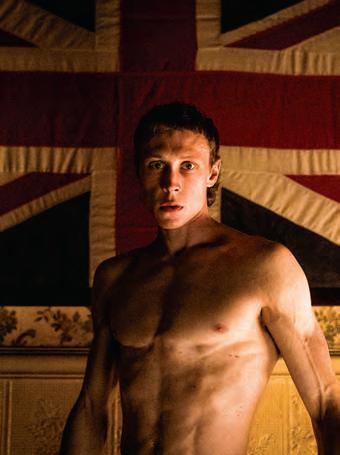

Photo: Signature Entertainment
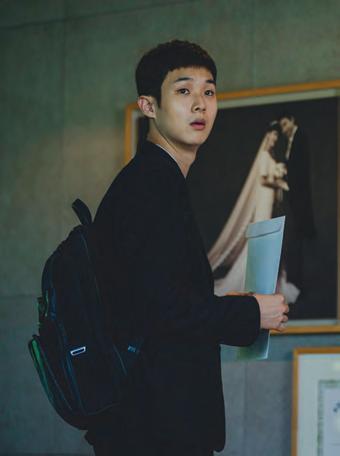

The True History of the Kelly Gang First Love Parasite Dark Waters
First Love Director: Takashi Miike Starring: Masataka Kubota, Nao Omori, Shota Sometani rrrrr
Takashi Miike returns with First Love, a chaotic action-thriller, rom-com hybrid. Set over the course of one eventful night in Tokyo, Leo (Masataka Kubota) – a sullen boxer diagnosed with a brain tumour – meets Monica (Sakurako Kanishi), who has been sold into a life of sex work and drug addictions by her abusive father. The pair bond over their unfortunate fates and a shared melancholy, thrown together when a dodgy deal between gangsters and crooked cops goes wrong.
Meanwhile, a colourful cast of assassins, rival gang members and mobsters enter the narrative, before most are violently dispatched via beheading. It sounds chaotic – and it is – but, with his mastery of the pulpy B-movie, Miike keeps the narrative moving with enough kinetic energy and tight storytelling that everything just about makes sense. It’s a testament to Miike and First Love’s editor, Akira Kamiya, that the film’s action is so coherent, cut with sharp precision and the right amount of panache and selfreferential, tongue-in-cheek humour. Miike is hardly reinventing the pulp wheel with First Love, but he is spinning it with glee. For a filmmaker with more than a hundred directing credits under his belt, First Love’s stamina is even more impressive. Let the formulaic plot and characters whizz past your head, and you’re in for a genuinely thrilling, ridiculous romp through Tokyo’s seedy underworld that’s likely to be a new favourite at midnight movie nights. [Katie Goh]
Released 14 Feb by Signature Entertainment; certificate 15 Dark Waters Director: Todd Haynes Starring: Mark Ruffalo, Anne Hathaway, Bill Camp, Tim Robbins, Victor Garber, Mare Winningham rrrrr
In Dark Waters, Mark Ruffalo takes a well-earned break from playing Hulk in the MCU to portray Robert Bilott, a real-life Cincinnati lawyer who tirelessly battled multinational chemical firm DuPont on behalf of more than 3500 residents of Parkersburg, West Virginia. A dour, hunched figure somewhat akin to an even less charismatic Gordon Brown, Ruffalo’s portrayal of Bilott doesn’t scream legal dynamism. But in time-honoured cinematic fashion, Bilott ploughs through a mountain of dusty paperwork and, in 2001, files a lawsuit against DuPont. The lawsuit’s progress over nearly two decades is painstakingly and expertly detailed. While thematic comparisons can be made to the livelier Erin Brockovich, Dark Waters has more in common with Kelly Reichardt’s Night Moves, which director Todd Haynes exec produced and shares a similarly cold, tense tone. Haynes’ regular cinematographer Edward Lachman does wonders with a muted colour pallet (he also shot Brockovich), while there’s solid support from Tim Robbins and Anne Hathaway, as Bilott’s wife Sarah.
After his dual-timeline period mystery Wonderland proved a rare misfire, Haynes has returned with a timely tale of environmental disaster and corporate corruption. The resulting drama may not be as remarkable as his masterpiece, Carol, but it represents a clear return to form for the American indie auteur. [Jamie Dunn]
— 49 — February 2020 — Review
You Creators: Sera Gamble, Greg Berlanti Starring: Penn Badgley, Victoria Pedretti, James Scully, Ambyr Childers rrrrr Pulpy stalker drama You has quickly become one of Netflix’s biggest and most meme-able hits (crossing over to Love Island Twitter, and unifying two of today’s top guilty pleasures). After killing his girlfriend Beck in season one, ‘dreamy and brooding’ Joe Goldberg flees New York to start a new life in Los Angeles as Will Bettelheim. Here he meets his new romantic obsession, Love Quinn, and integrates into an obnoxious LA social scene. More stalking and murdering ensues along with daft meta-writing and suitably wild plot twists. It’s slick trashy entertainment, somewhere between Dexter and Gossip Girl, but with even fewer morals. You deliberately pushes viewers into the icky position of sympathising with a serial killer in a cheeky critique on spectatorship and romantic film clichés, as well as our questionable preoccupation with abusers at the expense of their victims.
However, that self-awareness does not absolve You of its own immorality. A subplot in which Joe goes after a celeb who preys on underage girls tricks us into siding with him further, and through digging into Joe’s disturbing childhood the series comments on cycles of trauma, but also further opens the empathy gates. In its attempts to stretch the grey zones of its subject matter, You’s balance too often tips in favour of what it professes to mock. [Sanne Jehoul] Streaming on Netflix Sex Education: Season 2 Creator: Laurie Nunn Starring: Asa Butterfield, Gillian Anderson, Ncuti Gatwa, Emma Mackey, Connor Swindells rrrrr Moordale High is still clueless on matters of the heart and the bedroom, as seen in this season’s opener where a mini-epidemic of chlamydia breaks out, but Otis (Butterfield) – the uptight virgin turned sex counsellor – isn’t the only shagging expert on hand this term. His boundary-crossing sex therapist mother, Jean (Anderson), inadvertently cuts into her son’s side hustle when she’s brought in to fill the gaps in Moordale’s SRE curriculum. The upshot is to make Anderson more central to the show’s delightful ensemble cast, and that’s just one reason why these new episodes improve on season one. The show’s melange of British accents and humour dressed up in the codes and mores of American high school can feel discombobulating, but the characters always feel real and fully rounded. That’s also the case for the new additions, including statistics-obsessed overachiever Viv and a mysterious French student with a penchant for Pablo Naruda.
This humanistic approach can go too far – the transformation of the school bully (Swindells) from violent homophobe to bisexual sweetheart feels a tad too easy. Staged with more skill is a sexual assault storyline that brings the core female cast together for a rousing episode splicing #MeToo and The Breakfast Club. As with the first season, sex-positivity abounds. Amid its messy mechanics, the pleasure and playfulness of what we all get up to behind closed doors is never forgotten. Sex Education reminds you how awkward it was to be a teenager – and how much fun it was too. [Jamie Dunn] The Outsider Creator: Richard Price Starring: Ben Mendelsohn, Cynthia Erivo, Bill Camp, Jeremy Bobb, Julianne Nicholson, Mare Winningham, Paddy Considine, Yul Vazquez, Jason Bateman, Marc Menchaca rrrrr Based on Stephen King’s novel of the same name, The Outsider follows a seemingly straightforward investigation into the gruesome murder of a young boy. But as a supernatural force edges its way into the case, it leads the seasoned cop in charge (the ever-reliable Ben Mendelsohn) and an unorthodox investigator (Cynthia Erivo, who deftly fleshes out a character who could easily just be a bag of quirks) to question the foundations of the world they thought they knew.
The first two episodes show just what King can do with a well-worn genre like the procedural. They’re darkly compelling, digging into the warped nature of the crime, along with the culprit’s peculiar indifference to covering their tracks. Mendelsohn’s cop has the case handed to him on a silver platter, but his due diligence as he interviews witnesses and sifts evidence casts an eerie pall. What he finds suggests a world knocked out of whack. Everything seems clear cut and incontrovertible, and yet it also feels wrong.
It’s as it enters its third episode that the usual King warning signs begin to appear – and if this follows the book exactly, the problems will only be compounded as the series goes on. Something supernatural is definitely afoot, and that’s fine. What’s less fine is that here – as with other King adaptations (and their source material) – you get the overwhelming impression that he’s no more sure about his ‘entity’ (and its abilities) than we are. [Tom Charles] Broadcast on Sky Atlantic and Now TV At Home
Sex Education Photo: Netflix Photo: Netflix Photo: Sky Atlantic


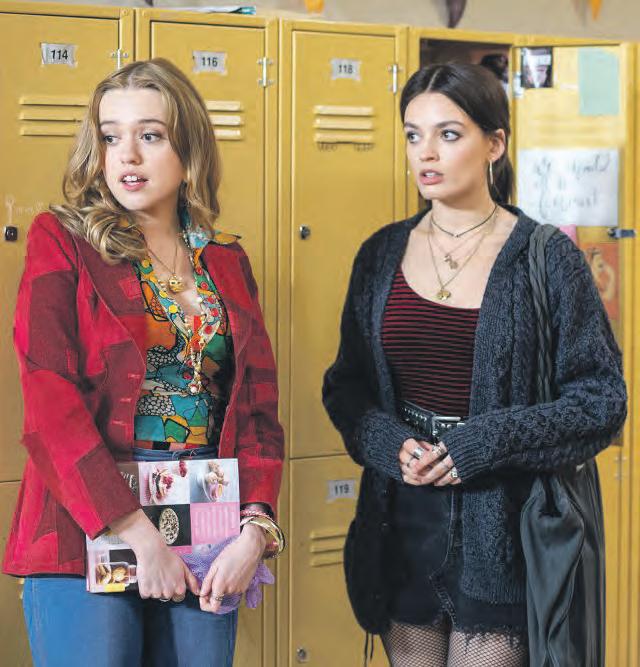
You
Streaming on Netflix
TV & Streaming Highlights in February 2020

Altered Carbon 27 Feb, Netflix More sci-fi scrapping and body-swapping antics.

Cheer Out now, Netflix Warts-and-all look at the world of competitive cheerleading.

I Am Not Okay With This 26 Feb, Netflix High school drama based on a comic by the creator of End of the F***ing World.

Inside No. 9 Weekly from 3 Feb, BBC iPlayer Unpredictable anthology from one half of The League of Gentlemen.

Shrill Out now, BBC iPlayer Razor-sharp sitcom by SNL’s Aidy Bryant, back for a second series.
GLORIOSA
Gloriosa, 1321 Argyle St, Glasgow
0141 334 0594
gloriosaglasgow.com i: @gloriosa_glasgow
Kitchen open Wed - Sun, midday-10.30pm Bar open Sun, Wed, Thu 11ammidnight; Fri - Sat, 11am-1am Closed Mon - Tue
Eating at Gloriosa, the new restaurant from former Alchemilla head chef Rosie Healey, is a bit like going for dinner at an extremely knowledgeable pal’s flat. You show up, they throw out a bunch of interesting, if occasionally difficult-to-parse suggestions, you smile and nod, and it turns out you were wrong to ever doubt them.
A couple of early dishes set the tone. First up, the marinated carrots (£2.50) – thick coins of veg smothered in a spicy, garlicky marinade – and then the bagna cauda (£6). It’s an Italian garlic and anchovy dip, into which you smash a piece of veg and head off on a brief but extremely savoury ride. Next up is a napkin-thin flatbread covered in goats cheese curd, honey, walnuts and thyme (£7). It’s a surprisingly earthy yet exceptionally light bit of food, and the cheese on top is the kind of creamy and smooth dairy explosion you yearn for every time you head to the fridge, rapidly-cooling bagel in hand. The seabass carpaccio (£13) is the kind of plate that provokes gasps when it reaches the table, and results in accidental headbutts when everyone tries to get the first forkful. Slivers of seabass cured in citrus and oil, plated up with chunks of orange, bright green pistachios and a hefty sprinkling of Aleppo pepper; it’s like a big fishy sun shining in through the

Words: Peter Simpson
restaurant’s enormous windows. It’s tangy, vibrant and genuinely exciting. It is also proof that the fork and the shallow bowl are not friends; if you order this dish, or something similar to it, grab a spoon from nearby to save the delicious liquid that’s left over.
The red mullet with olive tapenade (£7) turns up last, and does a fairly good job of summarising everything that’s happened so far. It’s colourful, nice to look at, but not too showy; it’s a fish, and next to it is some tapenade. It’s well-cooked, extremely tasty, and it’s very nicely balanced. The individual bits are very nice, and they go very well together. Teamwork – turns out it’s a good idea after all.
That’s the savoury story. The sweets, on the other hand, are engaged in some kind of competition to see who can be the most outlandish and over-the-top. The hazelnut, ricotta and olive oil cake (£6) gives a good account of itself, hiding an almost mousse-like centre underneath a crunchy exterior coated in toasted hazelnuts. But the panna cotta (£6), wobbling away like nobody’s watching while drowning in an outlandishly bitter burnt caramel syrup, is an absolute banger that should have baying crowds banging on those big windows night and day.
Strange Hotel By Eimear McBride rrrrr
The Wolf of Baghdad By Carol Isaacs rrrrr
A Tall History of Sugar By Curdella Forbes rrrrr
Exercises in Control By Annabel Banks rrrrr
In Eimear McBride’s third novel, an unnamed woman enters different hotel rooms in different cities across the world. Over these anonymous hotel stays, a form emerges from the fog of her internal life. The woman is Irish, like McBride herself and her other novels’ protagonists. She is middleaged and meets men in strange cities but is always careful to keep them at arm’s length. She over-intellectualises situations and scolds herself for this habit. She doesn’t have much time for France and is barely keeping a previous grief at bay. Throughout Strange Hotel, this repressed past constantly threatens to spill through the space between the words.
For half of the slim novel, the narration feels distant from us, often cold, until, suddenly, with the magic alchemy that only novels have, the boundaries between the reader, the writer, the narrator and the character collapse in on each other and there’s only one voice left. No one in contemporary fiction can capture what McBride can: the rich, sometimes excruciating, often humiliating, intimacy of a thought.
But, thankfully, McBride’s linguistic prowess doesn’t remain aloft in an ivory tower. In all her novels, her characters’ emotions are the driving force behind the words. There might be a familiarity to the woman’s internal life, but her form, appetites and identity remain very much her own. McBride is also self-aware, winking at her narrator’s overthinking, and often funny. But mostly, she’s empathetic – to her characters, to her readers and to the secrets, memories and griefs that form our sense of being in this absurd world. [Katie Goh]
Faber, £12.99, 6 Feb In the 1940s, roughly one third of Baghdad’s population was Jewish. By 2016, this number had dropped to just five people. A haunting journey through memory, trauma and loss, graphic memoir The Wolf of Baghdad draws on autobiography, folklore and history to confront this tragic dissolution of an entire community. Carol Isaacs’ panels are entirely wordless, relying instead on emotive illustrations of her family and heritage’s ghostly remains, with text isolated on otherwise blank pages in the form of anecdotes, reminiscences and lamentations collected from family members and other Baghdadi Jews. Isaacs’ visual style is muted yet incisive, her textual minimalism allowing the images to breathe and linger. However, the scarcity of text also leads The Wolf of Baghdad to lack the complex internal characterisation that makes other graphic memoirs, such as Persepolis, so potent and heart wrenching. This reduced nuance also extends to the, at times, flattened relationship between the Arab and Jewish populations, a subject that – in its continued fraught state – cannot be skimmed past. Where The Wolf of Baghdad most succeeds is in telling Isaacs’ own narrative, in which palimpsests of memory form a fractured yet entangled relationship to a home she has never known. There is a Finnish word, kaukokaipuu, explains Isaacs, that means homesickness for a place you’ve never been. For those similarly suspended between cultures, conflicts and belonging, The Wolf of Baghdad tells a poignant and achingly familiar story. [Anahit Behrooz] Moshe and Arrienne are different. Moshe was found in a river as a baby, with black features but skin whitishblue, whilst Arrienne’s height and dark skin set her apart from even her family. From the moment the two meet, they are drawn to one another as friends, twins and lovers. This epic, generation-spanning novel tells the tale of their lives with fantasy and history intertwining against the background of a newly independent Jamaica and a continually colonial Britain.
A Tall History of Sugar explores this shared experience of otherness, colour and colonialism in lives still governed by Jamaica’s plantation history. Moshe and Arrienne themselves embody a complex relationship between being Black and their own identities, told through their starkly different skin tones.
The strength of Curdella Forbes’ prose is her ability to deftly represent characters throughout varying stages of their lives. From confusing childhoods and awkward adolescences into adulthood, old age and dementia, Forbes perfectly captures the essence of her characters throughout the passing time. They feel fully formed and real.
Yet, the story’s scope can leave it feeling disjointed. It isn’t always clear where the narrative is going which can make it difficult to follow. The magic and history don’t always intertwine coherently, and where some aspects are fleshed out in detail, others seem a little lacking. [Emily Hay]
In this collection of short stories, Annabel Banks takes the reader through twelve tales that explore a very human preoccupation with control. In one story, a student becomes obsessed with Newton’s theory of colour and, in another, a cleaner discovers a dark secret in the office. In the collection’s titular tale, we see a station guard’s life choices determined by a coin and in an alternative story, a woman refuses to leave a crevice she has crawled into. The stories vary in length and tone, yet Banks’ voice is consistent in its strength throughout. The imagery in each tale is vivid, filling in the narrative gaps left by the prose, and ultimately leaving a disquieting feeling spread across the pages. There is often unspoken violence (although there is explicit animal cruelty in the titular story) and there is more to each story than what is explicitly stated. It feels like there are multiple potential meanings to be explored within, making Exercises in Control perfect for a book group. Often weird and sometimes funny, this debut collection ultimately scratches the surface of the everyday and ordinary, to reveal dark and unsettling creatures crawling beneath. [Rebecca Wojturska]
Influx Press, 20 Feb, £7.99






